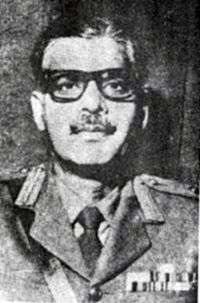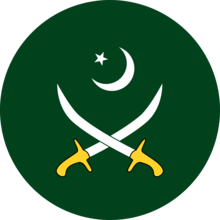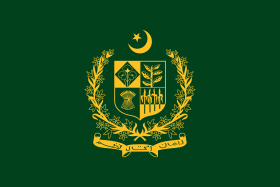Rao Farman Ali
Rao Farman Ali (Urdu: راؤ فرمان علی ), (January 1, 1922 – 20 January 2004) was a two-star general in the Pakistan Army and former political figure who is widely accused as a "conspirator" of the civil war in East Pakistan and one of directly responsible of the mass atrocities in East Pakistan.[2][3][4]
Rao Farman Ali راؤ فرمان علی | |
|---|---|
 | |
| Minister of Petroleum and Natural Resources | |
| In office 23 March 1985 – 29 May 1988 | |
| President | Zia-ul-Haq |
| Prime Minister | Muhammad Junejo |
| 3rd National Security Advisor | |
| In office 29 March 1985 – 17 August 1988 | |
| Preceded by | Tikka Khan |
| Succeeded by | Tariq Aziz |
| Managing Director of Fauji Foundation | |
| In office 1974–1985 | |
| Personal details | |
| Born | Rao Farman Ali Khan 1 January 1922[1] Rohtak, East Punjab, British India Present-day Haryana, India |
| Died | 20 January 2004 (aged 82) Rawalpindi, Punjab, Pakistan |
| Resting place | Westridge Cemetery |
| Citizenship | |
| Nationality | |
| Profession | Bureaucrat |
| Military service | |
| Branch/service | |
| Years of service | 1943–1972 |
| Rank | |
| Unit | 1st Artillery Regiment, Regiment of Artillery |
| Commands | Mil.Adv Govt. of EP DG Military Operations (DGMO) DG Military Training (DGMT) |
| Battles/wars | World War II Bangladesh Liberation War
|
| Service number | PA – 1364 |
Commissioned in September, 1943 as a forward observer in Regiment of Artillery, he served as military adviser to the East Pakistani military, and oversaw the deployment of military police aided with the Volunteers during the civil war unrest in East Pakistan in 1970–71.[5] He testified his responsibilities in the Hamoodur Rahman Commission in 1972 but denied allegations of mass atrocities committed in East Pakistan in spite of Commission proved the involvement of misconducts and atrocities of Pakistani military personnel.[6]
Upon being forced to retire, he joined the Fauji Foundation as an agronomist, and founded the Fauji Fertilizer Company Limited in 1978.[7] From 1985–88, he served as petroleum minister and National Security Advisor in President Zia-ul-Haq's administration, and went into hiding after Zia's death.[7]
Ali remains a controversial figure with East Pakistani civilian bureaucrats and his superior military officials accusing and branding him as "conspirator", "opportunist", and "swindler", and widely held him responsible of committing the mass atrocities in East Pakistan.[8]
Biography
Rao Farman Ali was born in Rohtak, East Punjab, British India in 1923.[9] His date of birth is read as 1 January 1923, according to the official headstone written in Urdu in his grave which is located in the Westridge cemetery in Rawalpindi.[1] Very little is known about his early life in the literature based on Pakistani military, and not much is published about his educational background.
He gained commissioned as an officer in the Regiment of Artillery of British Indian Army and participated in the World War II in 1943, on the side of the Great Britain.[10] In 1947, he opted for Pakistan Army and joined the Military Police.[9] His military career saw his repeated deployment in East Pakistan as a political adviser and later ascended as military adviser to East Pakistan Army.[9] In 1960s, his military assignments were posted at the Army GHQ and served in the Directorate-General of Military Operations (DGMO) and served as Director-General Military Training (DGMT), also at the Army GHQ.[7]
It is not known if Rao took participation in war with India in 1965, since he was stationed in East.[11] In 1967, he was again stationed in East as an officer commanding of the 14th Battalion; he was posted again and sent back to West.[11] In 1969, President Ayub Khan handed over the presidency to his Commander-in-Chief General Yahya Khan who posted Ali upon the request of Major-General Muzaffaruddin– the martial law administrator of East Pakistan.[11]
The posting came at the behest of the East Pakistani government requesting him due to his experiences in East.[11] He was the military adviser to the East Pakistan Army and elevated as the Defence Secretary of the East Pakistani government, serving from 1969–71.[12] He enjoyed full support of President Yahya Khan serving under several governors and oversaw various civil affairs in the government.757-759[10] He helped raise the paramilitary units such as the Volunteers (Razakars), Peace Committee, Al Badr, and Al Shams to counter the violence instigated by the Mukti Bahini.:758–759[10]
In 1971, when the talks with Awami League failed, Ali alongside with Lieutenant-General Tikka Khan launched the military crackdown on the Awami League under direction of President Yahya Khan.[5] Ali is held responsible for wide spread genocide and massacre took place in Dhaka University.[13] Hamoodur Rahman Commission though heavily criticized other senior military staff of Pakistan Army in East Pakistan at the time including confirmation of mass atrocities, cleared Ali citing the fact that he was not involved in any direct Military Operation due to the nature of his post which was mostly Administrative.[14]
Altaf Gohar, an East Pakistani civil servant, recounted an incident from his memory that a hit list had been drawn up for elimination of certain Bangalis.:27–30[3] A friend of Altaf Gohar was also in the list and his friends relatives requested Gohar if he could do something to save his friend.:28[3] Gohar held a meeting with Farman and requested him to drop the name from his hit list. " Farman took, said Gohar, a diary out of his drawer and crossed the name out. The name was of Mr. Sanaul Huq and he was spared.":29[3]
Pages of this very diary with lists of intellectuals were recovered from the debris of Rao Farman's office, the then Governor's House, which was bombed by Indian Air Force on 14 December.A note book was found in Rao farman Ali's office in Dhaka, One page contained a list of university teachers with addresses, with tick marks besides some of the names like "M. Haider Chy. Bangali" or "Saduddin-Sociology, 16-D, UQ" (university quarter). It is up to the readers to find out the reality of this page, and the meaning of the marks, bearing in mind that the last entry was most probably on 13 December.[15]
After the civil war in 1971 ended, Farman's diary was recovered from the ruins of the Governor's house. The copy of a page from the diary shows the list of intellectuals from Dhaka University. Out of which, 14 of them were killed on 14 December 1971.[16] In 1971, he, along with Niazi, sent telegram to U.S. Embassy in Dacca to transmit the surrender proposal to New Delhi.[17] Another message was directed by Farman Ali to United Nations which countermanded with the message sent by President Yahya Khan; his message was then described as "unauthorized."[18]
About the East Paksitan unrest, A.A.K. Niazi maintained that Farman requested the latter on multiple occasions to stationed him back to Pakistan after the Farman's gained notoriety over his involvement in the killing of the intellectuals.[13] A.A.K. Niazi wrote in his book, "The Betrayal of East Pakistan that Farman had quoted: "Mukti Bahini would kill him of his alleged massacre of the Bangalees and intellectuals on the night of 15–16 December. It was a pathetic sight to see him pale and almost on the verge of break down."[13] He is also alleged to have written in his Diary as: "Green Land of East Pakistan will be painted Red."[19] However, Farman Ali had denied all the accusations leveled against him, and branded these accusations as "lie."[11]
In 1972, Ali testified against A.A.K. Niazi in the Hamoodur Rahman Commission and noted that Niazi's morale collapsed as early as 7 December and cried fanatically over the progress report presented to the Abdul Motaleb Malik.[20] Controversy regarding his own involvement in the political events of East had arisen since he had denied all accusations leveled against him despite testifying his responsibilities as military adviser to East Pakistani military.[11]
Farman Ali was forcefully retired from the military in 1972 but appointed as Managing Director of Fauji Foundation in 1974 which he remained until 1984.[7] He served as an agronomist at the Fauji Foundation and helped create the chemical fertilizer and served its first director of the Fauji Fertilizer Company in 1978.[7] In 1985, he was appointed as Minister of Petroleum and Natural Resources and National Security Advisor in President Zia-ul-Haq's administration, which he served until 1988.[7]
After sudden death of President Zia-ul-Haq, Farman Ali reportedly went into hiding and lived a very quiet life in Rawalpindi on a pension.[7] Throughout the 1990s, he fought a brief illness and authored a book, Sar Gazisht, based on the East Pakistan crises.[7] On 20 January 2004, Farman Ali died and was laid to rest with military honors in Westridge cemetery in Rawalpindi, Punjab, Pakistan.[7]
References
- "Major General (Retd) Rao Farman Ali". www.everystockphoto.com/. Everystockphoto. Retrieved 29 August 2016.
- Mahfuz, Asif (13 December 2014). "Rao Farman Ali's master plan". www.thedailystar.net/. The Daily Star. Retrieved 29 August 2016.
- Ibrahim, Muntassir Mamoon ; translated from Bengali by Kushal (2000). The Vanquished Generals and the Liberation War of Bangladesh. Dhaka: Somoy Prokashan. pp. 70–71. ISBN 9789844582101.
- Tripathi, Salil. The Colonel Who Would Not Repent: The Bangladesh War and Its Unquiet Legacy. Yale University Press. pp. 186–187. ISBN 9780300218183. Retrieved 29 August 2016.
- Ganguly, Sumit. Conflict Unending: India-Pakistan Tensions Since 1947. Columbia University Press. pp. 59–60. ISBN 9780231507400.
- Hamoodur Rahman Commission Report Archived 4 March 2012 at the Wayback Machine
- "Rao Farman Ali passes away". Dawn Newspapers. 21 January 2004. Retrieved 29 August 2016.
- "Major General Rao Farman Ali Khan". www.genocidebangladesh.org/. Bangladesh Genocide Archive. 18 September 2008. Retrieved 29 August 2016.
- "Rao Farman Ali - Pakistan Who's Who". sites.google.com. sites.google.com. Retrieved 29 August 2016.
- Bhattacharya, Brigadier Samir. NOTHING BUT!. Partridge Publishing. ISBN 9781482816266. Retrieved 29 August 2016.
- (arup), অরূপ (13 March 2010). "অরূপকথা: Interview of Major General Rao Farman Ali AKA "The Butcher of Bengal"". অরূপকথা. অরূপকথা.
- Foundation, Bhashani. Searching for Bhasani Citizen of the World: The Life and Times of (Earnest) Mozlum Leader Maulana Bhasani. Xlibris Corporation. p. 197. ISBN 9781453573136. Retrieved 30 August 2016.
- "Major General Rao Farman Ali Khan". www.genocidebangladesh.org/major-general-rao-farman-ali-khan/. Bangla Desh source. 18 September 2008. Retrieved 30 August 2016.
- http://img.dunyanews.tv/images/docss/hamoodur_rahman_commission_report.pdf
- "Rao Farman Ali's master plan : Asif Mahfuz". The Daily Star. 14 December 2014. Retrieved 16 October 2017.
- Mamoon, Muntassir; translation by Kushal Ibrahim (June 2000). The Vanquished Generals and the Liberation War of Bangladesh (First ed.). Somoy Prokashon. p. 29. ISBN 984-458-210-5.
- Abbas, Hassan. Pakistan's Drift Into Extremism: Allah, the Army, and America's War on Terror. Routledge, Abbas. pp. 56–66. ISBN 9781317463283. Retrieved 30 August 2016.
- Singh, V. K. Leadership in the Indian Army: Biographies of Twelve Soldiers. SAGE. pp. 207–208. ISBN 9780761933229. Retrieved 30 August 2016.
- Dogra, Wg Cdr C. Deepak. Pakistan: Caught in the Whirlwind. Lancer Publishers LLC. ISBN 9781940988221. Retrieved 30 August 2016.
- Jones, Owen Bennett (2002). Pakistan: Eye of the Storm. Yale University Press, Jones. p. 183. ISBN 0300101473. Retrieved 30 August 2016.

